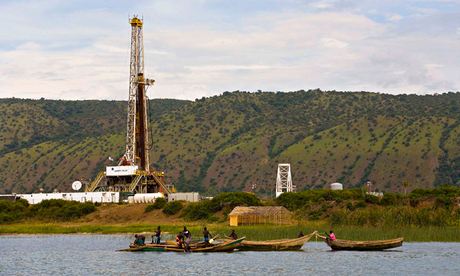The race is on between Uganda and Kenya to see which will emerge as the region's first oil producer. With the Ugandan government estimating reserves of about 3.5bn barrels and the UK's Tullow Oil announcing that last year's discoveries amounted to 600m barrels in northern Kenya, both countries are keen to press ahead with production and the promise that holds for increased revenues and national development.
Yet a number of issues stand in the way of realising the potential of what Tullow Oil has called "an emerging powerhouse in future global oil supply markets". The most obvious is that there is no means of exporting oil from the two inland basins – South Lokichar in the Lake Turkana region of Kenya and the Albertine Graben on the shores of Lake Albert in Uganda.
East African Community (EAC) leaders have agreed in principle to support Uganda's plans to build a refinery with a capacity of 30,000 barrels per day at Hoima, which would serve regional markets. Uganda believes this can create jobs and offer cheaper fuel for domestic consumption. "Our national oil and gas policy states that we want to use the country's resources to contribute to the early achievement of poverty eradication," said Gloria Sebikari, senior communications officer at the ministry of energy and mineral development on the shores of Lake Victoria in Entebbe.
However, international oil companies have stressed the importance of building an export pipeline concurrently, probably joining up the Albertine and Turkana deposits and then continuing to the Kenyan coast at Lamu. "An export pipeline is vital as it underpins the economic viability of the whole project including the refinery," said George Cazenove, spokesman for Tullow Oil in London.
Although the Kenyan government has expressed hope that it could begin oil production by 2016, a decision on the pipeline could take some time, not least because of the prohibitive cost – an estimated $4bn (£2.3bn) – that one of the countries would have to bear if they chose to go it alone.
Getting the oil projects started has also been delayed by each country setting up legal frameworks to govern, and writing policies to ensure that oil wealth is captured and put towards national development.
In Uganda, a third piece of oil legislation, the public finance bill, is being debated by parliament. It proposes a separate government account in which oil revenues should be deposited, which would be put towards general state investment priorities. But the government has abandoned the idea of civil society monitoring the spending of revenues, a concept that is popular with several international bodies including the Revenue Watch Institute.
 Fishermen row their boats next to an oil exploration site in Buliisa district in western Uganda. Photograph: Handout/Reuters
Fishermen row their boats next to an oil exploration site in Buliisa district in western Uganda. Photograph: Handout/Reuters
There has also been disappointment that there is no legal provision for contracts with oil companies to be published, and the government appears lukewarm on commitments made in 2008 to join the Extractive Industries Transparency Initiative (EITI). "This would be the major way for us to ensure that we are getting value for money, and it would show the government's goodwill to the world," said Winnie Ngarbiiwe, coordinator in Uganda of the campaigner group Publish What You Pay.
It is not clear how Tullow Oil's announcement this year that it would disclose its payments to foreign countries will impact on Uganda's apparent reluctance to publish details of its deals.
While Uganda is taking its time to make important decisions on managing the sector, Kenya appears to be motoring ahead. In fact, there has been civil society criticism of the speed in which legislation is being presented to parliament, and attempts to put all aspects of energy policy into one law – the energy bill. The government recently announced it wanted to push the bill through by June. "We're moving so fast, we really need to stop and think about getting this right," said Charles Wanguhu, from the Kenyan Civil Society Platform on Oil and Gas.
In any new oil-producing country, hopes are often high that the industry will create new jobs, which will have a positive impact on incomes and in turn, development. In this respect Uganda has fared quite well. Although it is estimated that overall only about 3,000 permanent jobs in the new industry will be created, Ugandan participation is high so far. The Chinese company CNOOC employs 70% Ugandans, Total employs 60%, and Tullow Oil 88%.
The government has also passed legislation that envisages the establishment of a state-owned national oil company, which will be entitled to a 15-20% stake in any future production. It has also set up training schemes and degree courses. But in neighbouring Kenya, Tullow Oil had to temporarily suspend its drilling operations last year after protests by local Turkana people demanding more jobs.
Uganda and Kenya are keen to avoid the pitfalls associated with the "resource curse", a theory that has identified paradoxically slower economic growth for poorer countries with rich natural resource endowments.
Ugandan officials seem sanguine about the possibility that after a headstart, the country may not be the first to produce. "Kenya might be perceived as moving fast but getting this right requires long-term commitments," said Sebikari. "Countries have rushed into things before, and we are going to make sure that we maximise value from this project."
https://www.theguardian.com/global-development/poverty-matters/2014/may/12/kenya-uganda-east-africa-first-oil-producer